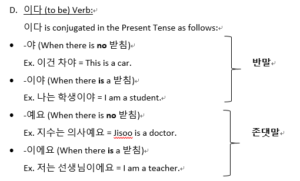Beginner 1 > Lesson 6
Lesson 6. Verb’s Present Tense Conjugation
Korean Verbs (Present Tense)
- Verbs in Korean are always placed at the very end of a sentence.
- All verbs have a Base form that end in ‘ -다 ’.
- The Base form is then Conjugated in Present, Past or Future forms, depending on the respective Conjugation rules.
- Present Tense can be used to state 1) what someone/something is doing/done right now, 2) what is generally the case, 3) imperative sentences (command, urge, suggestion), and it’s also sometimes used for 4) what one will do in the future.
CONJUGATING VERBS IN PRESENT TENSE
A. Stem + 아:
- When the Verb stem’s last letter has ‘ㅏ’ or ‘ㅗ’ vowels and ends in 받침: Delete ‘다’ and add ‘아’
Ex. 알다 (to know) = 알아.
저는 빅키씨를 알아요 = I know Miss Vicky.
Ex. 좋다 (to be good) = 좋아.
날씨가 좋아요 = The weather is good.
Ex. 살다 (to live) = 살아
저는 한국에 살아요 = I live in Korea.
- When the Verb stem ends only in the vowel ‘ㅏ’ (and no 받침): Delete ‘다’ and the stem itself is the present conjugated form
Ex. 가다 (to be go) = 가.
저는 학교에 가요 = I go to school.
Ex. 만나다 (to be meet) = 만나.
저는 매일 제프를 만나요 = I meet Jeff everyday.
Ex. 자다 (to sleep) = 자.
저는 일찍 자요 = I sleep early.
- When the Verb stem ends only in the vowel ‘ㅗ’ (and no 받침): Delete ‘다’ and add ‘ㅏ’ and combine them to : ㅘ
Ex. 오다 (to come) = 와 (오다 → 오아 → 와)
비가 와요 = It’s raining.
Ex. 보다 (to see) = 봐 (보다 → 보아 → 봐)
저는 TV를 안 봐요 = I don’t watch TV.
B. Stem + 어:
- When the Verb stem’s last letter ends in a vowel other than ‘ㅏ’ or ‘ㅗ’ vowels and ends in 받침: Delete ‘다’ and add ‘어’
Ex. 먹다 (to eat) = 먹어.
나는 매운 음식을 먹어 = I eat spicy food.
Ex. 읽다 (to read) = 읽어.
저는 책을 많이 읽어요 = I read a lot of books.
- When the Verb stem’s last letter ends in a vowel other than ‘ㅏ’ or ‘ㅗ’ vowels and ends in ‘ㅐ’, ‘ㅓ’ or ‘ㅕ’ vowels and has no 받침: Simply delete ‘다’ and the stem itself becomes the present conjugated form
Ex. 지내다 (to stay; do) = 지내.
저는 잘 지내요 = I am doing well.
Ex. 서다 (to stand) = 서.
거북이는 못 서요 = A turtle can’t stand.
Ex. 켜다 (to turn on) = 켜.
불 켜요 = Turn on the light.
- When the Verb stem’s last letter ends in a vowel other than ‘ㅏ’ or ‘ㅗ’ vowels and ends in ‘ㅜ’ vowel and has no 받침:
Ex. 배우다 (to learn) = 배워.
저는 한국어를 배워요 = I learn Korean.
Ex. 주다 (to give) = 줘.
나도 물을 줘 = Give me water as well.
(Delete ‘다’ and combine ‘우 + 어 = 워’)
- When the Verb stem’s last letter ends in a vowel other than ‘ㅏ’ or ‘ㅗ’ vowels and ends in ‘ㅣ’ vowel and has no 받침:
Ex. 마시다 (to drink) = 마셔.
저는 술을 못 마셔요 = I can’t drink alcohol.
Ex. 가르치다 (to teach) = 가르쳐.
저는 영어를 가르쳐요 = I teach English.
Ex. 기다리다 (to wait) = 기다려.
나를 기다려! = Wait for me!
(Delete ‘다’ and ‘ㅣ’ changes to ‘이 + 어 =ㅕ’)
C. Verbs ending in –하다: -하다 is conjugated in its Present form = 해
Ex. 말하다 (to say; tell) = 말해.
제프는 천천히 말해요 = Jeff speaks slowly.
Ex. 일하다 (to work) = 일해.
저는 회사에서 일해요 = I work in an office.
Ex. 공부하다 (to study) = 공부해요
Ex. 좋아하다 (to like) = 좋아해요
Ex. 잘하다 (to be good at) = 잘해요

*Some Common Irregular Verbs:
- 듣다 → 들어
Ex. 저는 좋은 음악만 들어요 = I only listen to good music.
- 쓰다 → 써
Ex. 지수는 글을 잘 써요 = Jisoo writes well.
- 고르다 → 골라
Ex. 하나만 골라요! = Choose only one!
- 모르다 →몰라
Ex. 난 널 몰라 = I don’t know you.
(We’ll learn more specifically about irregular verb conjugation in Beginner2 Course!)

